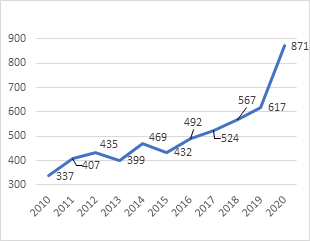A new paper published ONLINE FIRST with free readlink in the Journal of Population Economics finds that severe water contamination in the US modestly increased the rate of low birth weight, but had little effect on the length of gestation or rate of prematurity.
Something in the pipe: the Flint water crisis and health at birth
by Rui Wang, Xi Chen and Xun Li
Published ONLINE FIRST 2021: Journal of Population Economics
Free READLINK: https://rdcu.be/cytgm

Author Abstract: In 2014, the city of Flint, MI, in the USA changed its public water source, resulting in severe water contamination and a public health crisis. Using the Flint water crisis as a natural experiment, we estimate the effect of in utero exposure to polluted water on health at birth. Matching vital statistics birth records with various sources of data, we use the synthetic control method to identify the causal impact of water pollution on key birth outcomes. Our results suggest that the crisis modestly increased the rate of low birth weight (LBW) by 1.8 percentage points (or 15.5%) but had little effect on the length of gestation or rate of prematurity. However, these effects are larger among children born to black mothers, as indicated by an increase in the rate of LBW by 2.5 percentage points (or 19%). Children born to white mothers exhibit, on average, a 30.1-g decrease in birth weight. We find little evidence that the male-to-female sex ratio declines in the overall population, suggesting that the in utero scarring effect of the Flint water crisis may dominate the channel of mortality selection. However, we observe a slight decline in the sex ratio among children born to black mothers. Finally, we find no notable change in the fertility rates of either black women or white women in Flint. These results are robust to a rich set of placebo and falsification tests.

EiC Report 2020
SSCI IMPACT FACTOR 2.813 (2020) from 1.840 (2019) & 1.253 (2018)
SSCI 5-Year Impact Factor 3.318 (2020) from 2.353 (2019) & 2.072 (2018)
Journal of Population Economics
Access to the recently published Volume 34, Issue 4, July 2021. 10 articles on Covid-19 all freely accessible.
LEAD ARTICLE OF ISSUE 4, 2021:
The impact of repeated mass antigen testing for COVID-19 on the prevalence of the disease
by Martin Kahanec, Lukáš Lafférs & Bernhard Schmidpeter
OPEN ACCESS: Free Readlink – Download PDF
The Global Labor Organization (GLO) is an independent, non-partisan and non-governmental organization that functions as an international network and virtual platform to stimulate global research, debate and collaboration.
Ends;

